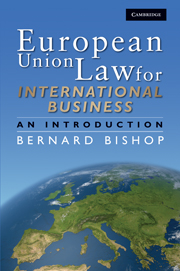Book contents
- Frontmatter
- Contents
- List of figures and tables
- List of case studies
- Preface
- Acknowledgements
- List of abbreviations
- Chapter 1 EU institutions and law making
- Chapter 2 Contracts for the sale of goods to an EU buyer
- Chapter 3 Transport of goods to an EU buyer
- Chapter 4 Customs law and procedure within the EU
- Chapter 5 Payment and risk management in international sales
- Chapter 6 Sales to the EU using an EU representative
- Chapter 7 Entering the EU market via franchising arrangements
- Chapter 8 Establishing a permanent presence in the EU
- Chapter 9 Resolving a dispute with an EU firm
- Index
- References
Chapter 8 - Establishing a permanent presence in the EU
Published online by Cambridge University Press: 05 June 2012
- Frontmatter
- Contents
- List of figures and tables
- List of case studies
- Preface
- Acknowledgements
- List of abbreviations
- Chapter 1 EU institutions and law making
- Chapter 2 Contracts for the sale of goods to an EU buyer
- Chapter 3 Transport of goods to an EU buyer
- Chapter 4 Customs law and procedure within the EU
- Chapter 5 Payment and risk management in international sales
- Chapter 6 Sales to the EU using an EU representative
- Chapter 7 Entering the EU market via franchising arrangements
- Chapter 8 Establishing a permanent presence in the EU
- Chapter 9 Resolving a dispute with an EU firm
- Index
- References
Summary
INTRODUCTION
Previous chapters have dealt with selling goods into the EU market either by direct exporting or via the intermediate step of having an agent or distributor as an on-the-ground presence. Alternatively, those with a successful business model for delivering either services or goods may decide to embark upon franchising within the EU. However, many exporters of services and those with regular customers for their goods may find it necessary to have a permanent presence in order to satisfy customer demands effectively and remain competitive.
Most firms wishing to set up a business presence within an EU member country do so by forming the equivalent of a private limited company in the European country where they intend to carry on their business. Frequently, the person or firm establishing the private limited company will wish to own 100% of the shares, making the new business a wholly owed subsidiary. In this way the firm maintains control of the operation while at the same time achieving the advantages of the new company being a separate legal entity. The disadvantages of forming a private limited company are that it cannot call on the public to subscribe capital, thus limiting capital contributions to amounts that the founders can raise. In addition, there are detailed procedures that must be followed to form a company and associated expenses such as legal fees, registration expenses and, in some cases, taxes on contributed capital.
- Type
- Chapter
- Information
- European Union Law for International BusinessAn Introduction, pp. 173 - 207Publisher: Cambridge University PressPrint publication year: 2009



